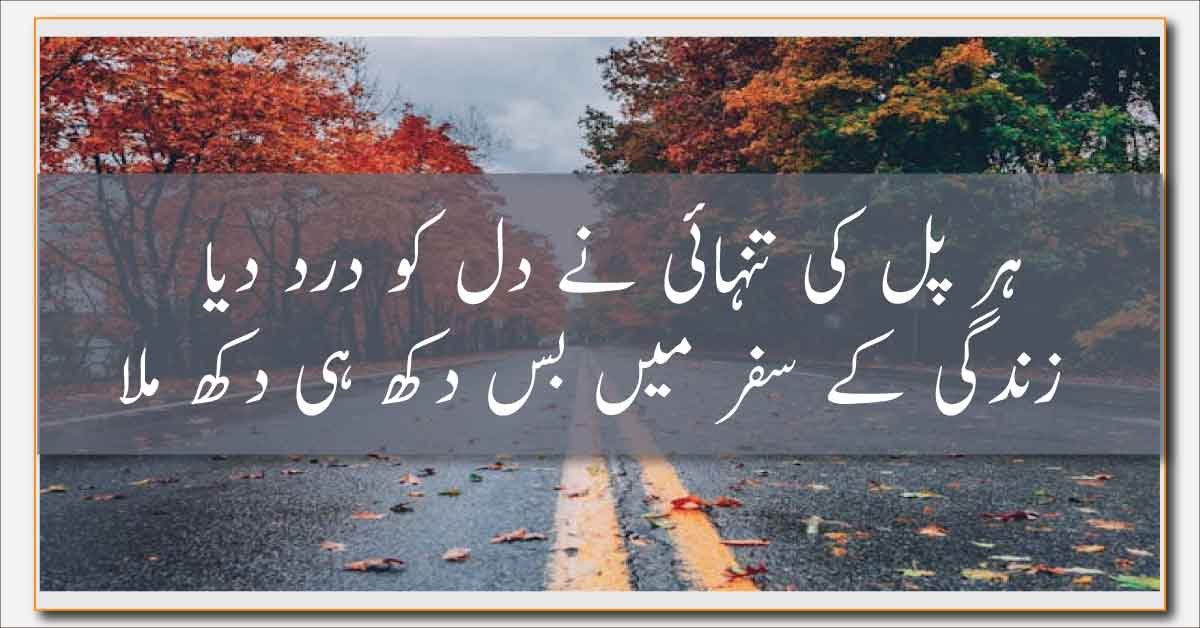Urdu poetry has long been a medium for expressing deep emotions, and one of the most recurring themes is sadness. Sad poetry in Urdu resonates with people who have experienced heartbreak, loss, and sorrow, giving them a way to articulate feelings that are often too difficult to express in everyday words. From the classical works of poets like Mirza Ghalib to the more contemporary voices of Jaun Elia and Parveen Shakir, Urdu poetry has always touched upon themes of love, separation, death, and longing.
In this post, we will explore some of the most sad poetry in Urdu, highlighting how these verses capture the depth of human emotion and continue to connect with readers today.
The Power of Sad Poetry in Urdu
Urdu is often considered one of the most expressive and poetic languages in the world. Its rich vocabulary and lyrical structure allow poets to convey deep emotions in ways that touch the soul. When it comes to sadness, Urdu poetry takes the reader on a journey through the poet’s inner world of pain and despair.
The themes of broken hearts, unfulfilled love, and tragic separation are central to the most poignant works of sad poetry in Urdu. These themes often mirror the personal experiences of both the poets and their readers, creating a universal connection between the words on the page and the feelings in the reader’s heart.
Why Sad Poetry in Urdu Resonates
Sadness is a universal emotion. Everyone experiences loss, heartache, or disappointment at some point in their lives. What makes sad Urdu poetry so impactful is its ability to turn these shared experiences into beautifully crafted verses that can be felt deeply by anyone who reads them.
For example, Ghalib’s poetry is famous for capturing the pain of separation and the inevitability of loss. His words often reflect the melancholy of unrequited love, a theme that resonates with many. Similarly, Jaun Elia’s work is characterized by its raw emotional depth and honesty. His ability to express existential sadness has made his poetry some of the most relatable and widely shared in the world of Urdu literature.
Common Themes in Sad Urdu Poetry
In the most sad poetry in Urdu, several key themes emerge repeatedly:
Judaai (Separation): This is one of the most powerful themes in Urdu poetry, often reflecting the pain of lovers being apart or the sorrow of losing a loved one to death.
Betrayal (Dhokha): Many sad poems focus on the pain of being deceived by a loved one or experiencing broken trust.
Longing (Aarzoo): Sad poetry frequently explores the feeling of longing, whether it’s for a person, a past time, or a sense of peace that feels unreachable.
These themes are relatable, no matter who the reader is, making sad Urdu poetry a reflection of our shared human experiences.
Most Famous Poets of Sad Poetry in Urdu
Some of the most celebrated poets in Urdu literature have written extensively about sadness:
Mirza Ghalib: Known for his intricate use of language and ability to express deep emotions, Ghalib’s poetry remains timeless.
Jaun Elia: His raw and unfiltered style brings the pain of existence to the forefront.
Parveen Shakir: One of the few prominent female voices in Urdu poetry, Shakir’s poems on love, loss, and betrayal have touched the hearts of many.
12 Most Sad Poetry In Urdu
دل کی ویران گلیوں میں خاموشی ہے بسی
زندگی کی خوشیوں میں غم کی چادر تنی۔
Dil ki weeran galiyon mein khamoshi hai basi,
Zindagi ki khushiyon mein gham ki chadar tani.
ہر پل کی تنہائی نے دل کو رلا دیا
غم کی اس دنیا نے ہر خواب مٹا دیا۔
Har pal ki tanhai ne dil ko rula diya,
Gham ki is duniya ne har khwab mita diya.
دل کے زخموں نے ہر خوشی چھین لی
زندگی کی ہر راہ میں بس غم ہی ملے۔
Dil ke zakhmon ne har khushi cheen li,
Zindagi ki har raah mein bas gham hi mile.
غموں کی چادر میں لپٹی زندگی
خوابوں کی دنیا میں بس اداسی ہی ملی۔
Ghamon ki chadar mein lipti zindagi,
Khwabon ki duniya mein bas udaasi hi mili.
دل کی دنیا میں بس ویرانی چھائی ہے
زندگی کے لمحے بھی اب دھندلے سے لگتے ہیں۔
Dil ki duniya mein bas weerani chhayi hai,
Zindagi ke lamhe bhi ab dhundlay se lagte hain.
خوابوں کی تعبیر میں غم کا سایہ ہے
دل کی دھڑکن میں بس درد کا قصہ ہے۔
Khwabon ki tabeer mein gham ka saaya hai,
Dil ki dhadkan mein bas dard ka qissa hai.
ہر پل کی یاد میں دل کا درد ہے
زندگی کے سفر میں بس غم کی آگ ہے۔
Har pal ki yaad mein dil ka dard hai,
Zindagi ke safar mein bas gham ki aag hai.
دل کی کتاب میں بس غم کے حرف ہیں
زندگی کے ہر لمحے میں بس دکھ کے باب ہیں۔
Dil ki kitaab mein bas gham ke harf hain,
Zindagi ke har lamhe mein bas dukh ke baab hain.
تیرے بغیر دل کا سکون بھی کھو گیا
زندگی کے خواب بھی اب ویران ہو گئے۔
Tere baghair dil ka sukoon bhi kho gaya,
Zindagi ke khwab bhi ab weeran ho gaye.
دل کے ٹوٹنے کا غم دل میں ہے چھپا
خوابوں کی دنیا نے ہر امید کو مٹا دیا۔
Dil ke tootne ka gham dil mein hai chhupa,
Khwabon ki duniya ne har umeed ko mita diya.
ہر پل کی تنہائی نے دل کو درد دیا
زندگی کے سفر میں بس دکھ ہی دکھ ملا۔
Har pal ki tanhai ne dil ko dard diya,
Zindagi ke safar mein bas dukh hi dukh mila.
غموں کی گہرائیوں میں دل نے پناہ لی
زندگی کے سفر میں ہر خواب ٹوٹ گیا۔
Ghamon ki gehraiyon mein dil ne panaah li,
Zindagi ke safar mein har khwab toot gaya.
Conclusion
The most sad poetry in Urdu allows readers to connect with their own feelings of pain and loss through the words of the poets. Whether it’s the sorrow of separation, the hurt of betrayal, or the lingering ache of unrequited love, these verses resonate deeply with anyone who has experienced sadness. Urdu poetry continues to be a source of solace for those seeking an outlet for their emotions, helping them navigate the complexities of the human heart.
Broken Heart Sad Poetry in Urdu
( Hasan Sagar )

